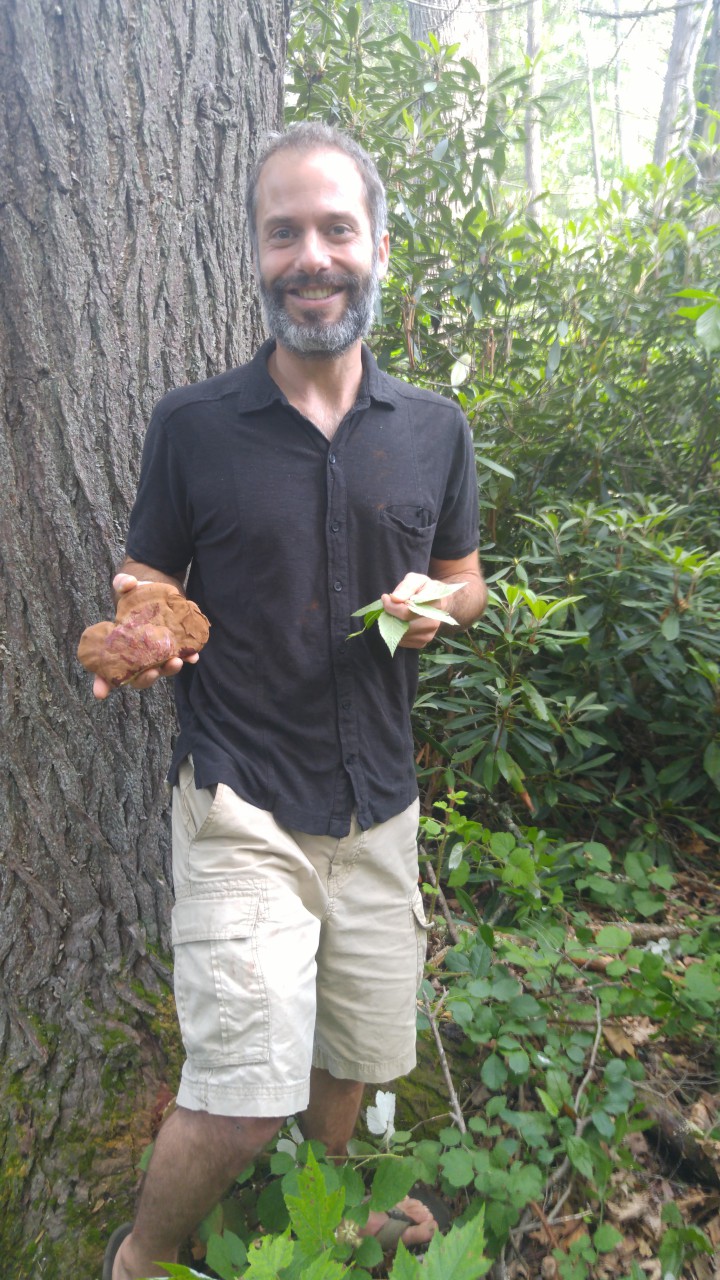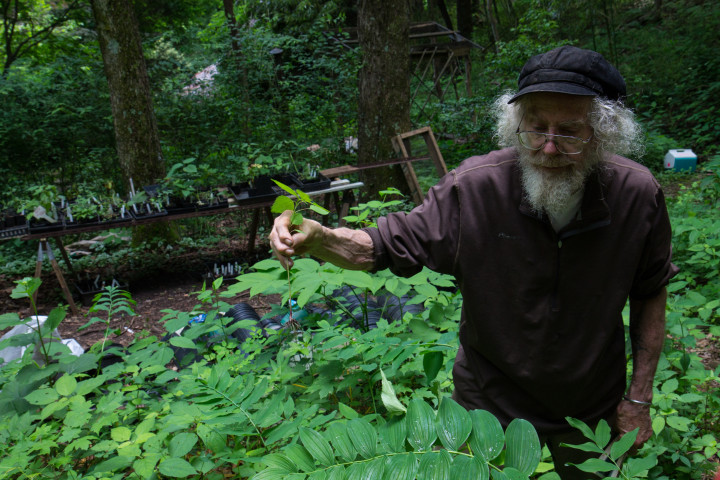Eating wild food foraged from local forests, meadows and backyards can improve health and nourish the soul, say Asheville-based wild food experts.
“Wild foods are basically superfoods,” says Natalie Bogwalker, referring to the many edible plants, trees, roots and fungi that grow naturally in forests, meadows and some backyards. “The nutrients in wild foods are way more concentrated than anything you can get in the store,” says Bogwalker, founder of Wild Abundance, an Asheville-based business teaching primitive skills, eco-homesteading and permaculture. She is also the founder and director of the Firefly Gathering, the largest primitive and survival skills gathering in the country.
“Wild foods tend to make people more like wild people — more sprightly, less bloated and more energized,” says Bogwalker, who is writing a book about wild food preservation and leading three-day foraging adventure tours.
She says one of her favorite local wild edible plants is chickweed, which is “superduper common and supernutrient-dense.” Chickweed, one of the best foods for skin health and purification of blood and the lymphatic system, is also high in calcium, iron, niacin, antioxidants and vitamin C, Bogwalker adds.
Alan Muskat, owner of Asheville-based No Taste Like Home, the oldest forage-to-table tour company in the country, says, “Dandelion and nettle are two of the most nutritious plants there are.” And they’re very common in the Asheville area.
Belying its reputation as a weed, dandelion greens offer a nutrient powerhouse, with eight times more antioxidants, two times more calcium, three times more vitamin A and five times more vitamin K and E than spinach, says Muskat, referring to nutrition information in Jo Robinson’s book Eat on the Wild Side,, which he reviewed on his website.
One of the reasons wild foods are more nutritious is that many are perennials, says Dimitri Magiasis, a doctor of naturopathic medicine and foraging tour leader for No Taste Like Home. “Perennial means they don’t die every year. The tops might, but the roots will stay alive. That’s important because the roots will get bigger and deeper and therefore are able to extract more nutrients that lie deeper in the soil. That’s why many wild foods are more nutritious,” he says.

But it is not just about nutrients, says Joe Hollis, owner and founder of Mountain Gardens in Burnvsille. “From a Chinese perspective, all wild foods are tonic,” he says. In comparison, most vegetables found in the grocery store “have been bred to be more palatable maybe, more tender, more sweet, less bitter and also more shippable in a lot of cases. The wild foods are more like the original natural plant. From a Chinese perspective that means they have more chi,” says Hollis, who grows Chinese medicinal plants and sells them to local Chinese herbalists and acupuncturists.
“The idea is that the original plant, with its original integrity, growing in its own habitat, not being manipulated [by humans], will have more of the chi energy that goes with the plant,” he continues. Chi, sometimes called life force energy or prana, “is what makes the whole world go round,” he says. The stronger chi of wild plants makes them a health tonic, he explains.
Magiasis and Muskat add that foraging, the process of collecting wild food oneself, is an integral part of the health benefits.
“People can’t just go to the store and buy wild food. … You won’t get all the benefits from wild food healthwise unless you gather it yourself,” says Muskat, who writes about the importance of foraging in his book Coming Home, which is available on his website. His second book, Wild Mushrooms: From Forest to Table, will be published next year by New Society Publishers. Muscat is also the founder of The Afikomen Project, a No Taste Like Home public education project that aims to teach children in the U.S. to safely identify and harvest the 10 most common wild foods in their area.
Muskat notes that foraged wild food is fresher and more nutrient-dense, as most plant-based foods begin to lose nutritional value within hours of being picked.
But he adds that even “more important is the relationship with the forest. It’s called forest bathing. To be healthy, people need to be where we evolved to be,” he says, referring to 30 years of medical research verifying the health benefits of spending time in nature.
As a society, says Magiasis, we believe that good nutrition and health can be reduced to a pill or herbal medicine that mimics the active ingredient of a particular plant. “I think a lot of the time we focus too heavily on that,” he says. “For example, on the [No Taste Like Home] tour, we do it as a group, so [we have] the social connection of gathering food together — we forget about the health benefits of that. We also forget about the health benefits of being outside, having our feet on the ground. There are a lot of studies now that show being outside in bare feet helps with heart rate variability. Being in the sun, in the fresh air,” says Magiasis, all play a part in why foraging and eating wild foods are healthy.
But with toxic plants and poison mushrooms possibly growing next to healthy, edible ones, is foraging safe?
Foraged food is safer than store-bought food because, in addition to being high in nutrients, it is not genetically modified or contaminated with pesticides, herbicides, insecticides and fungicides, says Muskat.
“It’s very easy to be safe [when foraging]. There’s only one word you have to remember. Ready?” asks Muskat, pausing. “It is a simple three letter-word: Ask. Don’t look it up in book, don’t look up online. You have to ask a human being for help. That’s all,” he says.
But, Magiasis warns, “It is superimportant you are 100 percent sure when you are about to eat something.” He adds that although it may sound overwhelming, “the more you immerse yourself in the world of plants and the land around you, the more you’ll feel more comfortable” identifying what you see.
Muskat says interest in wild foods is growing wildly. “Just this morning I counted half a dozen books on foraging for [ingredients for] cocktails and drinks published in the last two years. For food there are probably five times as many [books].”
He adds that he hopes the growing interest in wild food will herald a heightened awareness of the connection between personal health and planetary health. “Holistic health, which talks of mind, body and spirit, is not only contained with our physical frame,” he says. “We can’t be healthy outside of a healthy Earth because we are [all] one thing. We are realizing that is the healthiest thing you can do.”

MORE INFO
Natalie Bogwalker
wildabundance.net
Alan Muscat
notastelikehome.org
Joe Hollis
mountaingardensherbs.com



Before you comment
The comments section is here to provide a platform for civil dialogue on the issues we face together as a local community. Xpress is committed to offering this platform for all voices, but when the tone of the discussion gets nasty or strays off topic, we believe many people choose not to participate. Xpress editors are determined to moderate comments to ensure a constructive interchange is maintained. All comments judged not to be in keeping with the spirit of civil discourse will be removed and repeat violators will be banned. See here for our terms of service. Thank you for being part of this effort to promote respectful discussion.